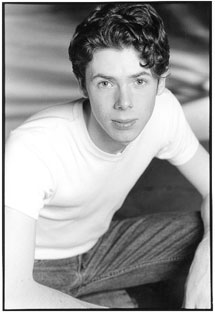Writing Residency Prize in Stageplay for 2000:
 Damien
Atkins is 26 years old. Since graduating from Grant MacEwan's Musical
theatre Program in 1994, Damien has worked with companies such as The
Canadian Stage Co., Theatre Calgary, and both the Shaw and Stratford Festivals.
Selected credits include the Canadian Premiere of the acclaimed British
play "Shopping and Fucking" with Crow's Theatre, Osric in "Hamlet",
Mendel in "Fiddler on the Roof", Dapper in "The Alchemist",
and "Macbeth", "The Tempest", "Titus Andronicus"
and "Elizabeth Rex" for the Stratford Festival, "Our Country's
Good" for Theatrefront, "The Chocolate Soldier" and "Titanic"
for the Shaw Festival, Jack in the Canadian Premiere of "Into the
Woods" for Canadian Stage Co./Theatre Calgary, and the title role
in Brad Fraser's "Young Art" for Theatre Network. Additional
credits include the film "Angel Square" with Anne Wheeler, and
"The Veldt" for Ray Bradbury Theatre and the upcoming "Children
of My Heart", "Attention to Detail", "The Art of Woo",
"I Was a Rat" (BBC) and "The Matthew Shepard Story"
for NBC. In 1996, at the age of 20, Damien received an Elizabeth Sterling
Haynes Award for Outstanding Performance, for a play he wrote and performs,
"Miss Chatelaine", which played at the Grand Theatre in London
in the winter of 1998, and opened in Toronto at Theatre Passe Muraille
in January 1999 to sold out houses and critical acclaim. He has also won
the Elliot Hayes Award from the Stratford Festival for Outstanding New
Playwright. His second play, "Good Mother" won the $25,000 University
of British Columbia's Creative Writing Program's Prism International Prize
for 2000 and received its world premiere at the Stratford Festival in
2001. He is the youngest playwright ever to be produced at the Stratford
Festival. Damien's new cabaret show, "Real Live Girl" will premiere
at Buddies in Bad Times Theatre in Toronto in December 2001. Damien is
also currently at work on a new play for Buddies in Bad Times, a play
commissioned by the Stratford Festival, and a collection of short stories.
Damien
Atkins is 26 years old. Since graduating from Grant MacEwan's Musical
theatre Program in 1994, Damien has worked with companies such as The
Canadian Stage Co., Theatre Calgary, and both the Shaw and Stratford Festivals.
Selected credits include the Canadian Premiere of the acclaimed British
play "Shopping and Fucking" with Crow's Theatre, Osric in "Hamlet",
Mendel in "Fiddler on the Roof", Dapper in "The Alchemist",
and "Macbeth", "The Tempest", "Titus Andronicus"
and "Elizabeth Rex" for the Stratford Festival, "Our Country's
Good" for Theatrefront, "The Chocolate Soldier" and "Titanic"
for the Shaw Festival, Jack in the Canadian Premiere of "Into the
Woods" for Canadian Stage Co./Theatre Calgary, and the title role
in Brad Fraser's "Young Art" for Theatre Network. Additional
credits include the film "Angel Square" with Anne Wheeler, and
"The Veldt" for Ray Bradbury Theatre and the upcoming "Children
of My Heart", "Attention to Detail", "The Art of Woo",
"I Was a Rat" (BBC) and "The Matthew Shepard Story"
for NBC. In 1996, at the age of 20, Damien received an Elizabeth Sterling
Haynes Award for Outstanding Performance, for a play he wrote and performs,
"Miss Chatelaine", which played at the Grand Theatre in London
in the winter of 1998, and opened in Toronto at Theatre Passe Muraille
in January 1999 to sold out houses and critical acclaim. He has also won
the Elliot Hayes Award from the Stratford Festival for Outstanding New
Playwright. His second play, "Good Mother" won the $25,000 University
of British Columbia's Creative Writing Program's Prism International Prize
for 2000 and received its world premiere at the Stratford Festival in
2001. He is the youngest playwright ever to be produced at the Stratford
Festival. Damien's new cabaret show, "Real Live Girl" will premiere
at Buddies in Bad Times Theatre in Toronto in December 2001. Damien is
also currently at work on a new play for Buddies in Bad Times, a play
commissioned by the Stratford Festival, and a collection of short stories. I started writing the play in 1997 (I have actually written in on three
different computers: my old Apple 2C, a battered old Apple laptop, and
my new iBook laptop) when I was working at the Shaw Festival. When I was
not asked back, which was difficult, I needed something to keep myself
working and feeling productive until I could get another acting gig. So
I continued working on Good Mother - challenging myself to see if I could
write a multi character play for other actors, with a simple story but
complex emotions. I showed the script (at first it was 150 pages) to various
friends, well known writer Michael MacLennan among them, and they all
gave me interesting notes. My best friend Shelley is actually my best
editor. When i went to Stratford I organized a reading of the play and
people kept talking aboutit so much that I had to organize another, official
reading for the artistic director when I returned in my second year. I
heard nothing for a few months, and then he came to me with the news that
he had just received board of governors approval to do the play. Shortly
after that I won the PRISM award. It all happened at once. We had been
workshopping this play all year, leading up to the premiere at Stratford,
and the Festival was one hundred percent committed to it.
I started writing the play in 1997 (I have actually written in on three
different computers: my old Apple 2C, a battered old Apple laptop, and
my new iBook laptop) when I was working at the Shaw Festival. When I was
not asked back, which was difficult, I needed something to keep myself
working and feeling productive until I could get another acting gig. So
I continued working on Good Mother - challenging myself to see if I could
write a multi character play for other actors, with a simple story but
complex emotions. I showed the script (at first it was 150 pages) to various
friends, well known writer Michael MacLennan among them, and they all
gave me interesting notes. My best friend Shelley is actually my best
editor. When i went to Stratford I organized a reading of the play and
people kept talking aboutit so much that I had to organize another, official
reading for the artistic director when I returned in my second year. I
heard nothing for a few months, and then he came to me with the news that
he had just received board of governors approval to do the play. Shortly
after that I won the PRISM award. It all happened at once. We had been
workshopping this play all year, leading up to the premiere at Stratford,
and the Festival was one hundred percent committed to it. Your
personality lives in your brain. Learned behaviours, attitudes, eccentricities.
It's just biology. Anne has had a mind altering event. " Speaking
is 'Good Mother''s resident neuropsychologist, Kathryn Omer. The "Anne"
in question here is Anne Driver, the mother of the Driver Family, and
unquestionably the gravitational centre of the family solar system.
Dr. Omer's opinion has been carved out of decades of studying the brain
and brain injury survivors. But is she right? What makes up someone's
personality? Is it hard wired into your brain? Or is it something ineffable,
something not so easily placed, is your personality your soul? Or a
third and stranger option: does our personality live only in the way
we are perceived by other people? If that's true, then we define each
other, and are defined by people's perceptions. We "own" little
pieces of each other. No wonder we find it so hard to let people go.
Someone dies, a relationship breaks up, someone moves away - often we
are called upon to let someone go. Most of the time we find it difficult,
if not impossible. The situation in "Good Mother" is even
more complicated. A woman suffers a stroke and a brain injury and her
personality has been strangely and posssibly irrevocably altered. Her
family struggles to find a balance between hoping that she will get
better, and moving on. But Anne's body is still alive, even if her old
personality is not, and it is a constant reminder to them of the woman
she used to be. Researching brain injuries yielded twenty plays' worth
of interesting details and provocative questions. Groups of brain injury
survivors often have conflicting and contradictory presentations of
their brain injuries. No two are alike. Even published materials can
be wildly contradictory. I investigated the medicine to find the most
telling symptoms - symptoms that we could bring to the stage. The fact
that Anne can remember some things, but not everything, the fact that
she can remember who she used to be and still finds it hard to be that
person again, must seem like a cruel nightmare to the Driver family.
But these are typical symptoms of people who have suffered some form
of brain trauma.I get a great deal of inspiration from listening to
music. I can remember listening to Jann Arden's "Good Mother"
and thinking that it contained a unique sentiment for pop music: gratitude.
"I've got money in my pocket/I like the colour of my hair/I've
got a friend who loves me/I've got a house, I've got a car/I've got
a good mother..." Gratitude. Sometimes it's difficult for us to
remember that our parents had a life before we came along. We forget
that they even existed before we came along. The song inspired me to
create a situation where a family is forced to confront someone they
had taken for granted - their mother. I am very close to my parents,
and the thought of losing them is terrifying to me. And if they got
sick, what would be my responsibility to them? They took care of me
for so many years without my thanks - will it be my turn to take care
of them someday?
Your
personality lives in your brain. Learned behaviours, attitudes, eccentricities.
It's just biology. Anne has had a mind altering event. " Speaking
is 'Good Mother''s resident neuropsychologist, Kathryn Omer. The "Anne"
in question here is Anne Driver, the mother of the Driver Family, and
unquestionably the gravitational centre of the family solar system.
Dr. Omer's opinion has been carved out of decades of studying the brain
and brain injury survivors. But is she right? What makes up someone's
personality? Is it hard wired into your brain? Or is it something ineffable,
something not so easily placed, is your personality your soul? Or a
third and stranger option: does our personality live only in the way
we are perceived by other people? If that's true, then we define each
other, and are defined by people's perceptions. We "own" little
pieces of each other. No wonder we find it so hard to let people go.
Someone dies, a relationship breaks up, someone moves away - often we
are called upon to let someone go. Most of the time we find it difficult,
if not impossible. The situation in "Good Mother" is even
more complicated. A woman suffers a stroke and a brain injury and her
personality has been strangely and posssibly irrevocably altered. Her
family struggles to find a balance between hoping that she will get
better, and moving on. But Anne's body is still alive, even if her old
personality is not, and it is a constant reminder to them of the woman
she used to be. Researching brain injuries yielded twenty plays' worth
of interesting details and provocative questions. Groups of brain injury
survivors often have conflicting and contradictory presentations of
their brain injuries. No two are alike. Even published materials can
be wildly contradictory. I investigated the medicine to find the most
telling symptoms - symptoms that we could bring to the stage. The fact
that Anne can remember some things, but not everything, the fact that
she can remember who she used to be and still finds it hard to be that
person again, must seem like a cruel nightmare to the Driver family.
But these are typical symptoms of people who have suffered some form
of brain trauma.I get a great deal of inspiration from listening to
music. I can remember listening to Jann Arden's "Good Mother"
and thinking that it contained a unique sentiment for pop music: gratitude.
"I've got money in my pocket/I like the colour of my hair/I've
got a friend who loves me/I've got a house, I've got a car/I've got
a good mother..." Gratitude. Sometimes it's difficult for us to
remember that our parents had a life before we came along. We forget
that they even existed before we came along. The song inspired me to
create a situation where a family is forced to confront someone they
had taken for granted - their mother. I am very close to my parents,
and the thought of losing them is terrifying to me. And if they got
sick, what would be my responsibility to them? They took care of me
for so many years without my thanks - will it be my turn to take care
of them someday?
Another obvious inspiration for the play was Joni Mitchell's "Both
Sides, Now". It is a fact of growing up that at some point we are
forced to reexamine old issues from the opposite point of view, but
what happens when you have to bridge those opposing views well before
you thought you were ready? I have always been curious about the way
people recover from tragedies. Where do we find the strength inside
of us to cope, to move on? There are no hard answers anywhere. There
is no rule book for life. There are theories, therapies, strategies,
but ultimately each person has to come to some private reconciliation
with a tragic event. Each person has to decide whether or not he can
find the energy inside him to move on. Not everybody succeeds. This
is what I wanted to explore with "Good Mother". Survival.
Each member of the Driver family has to find a way to survive, and they
all go about it differently with initially varied measures of success.There
are some things, some events - like the loss of a loved one - that we
try not to think about, we try not to imagine them happening, because
we cannot imagine how our lives would go on if they did. But in "Good
Mother" - as sometimes in real life, the unthinkable happens -
the mother of the family, the woman who seems to have the key to all
of their daily lives, has a terrible, shattering accident. And suddenly
the family has to reorganize around that event. The interesting thing
for me was to put a family in this "no man's land" - a place
where they never dared to imagine they'd be - and see whether they had
the strength to survive. I hoped they would. The wounds of some tragedies
never go away, but writing this play, and watching these people find
hidden reserves of strength and compassion, I was forced not only to
acknowledge our own basic human resilience, but the strength and resilience
of hope itself.
I have been greatly inspired by all the other young writers out there
who are writing and producing their own work. I hope that all writers
have benefitted from the kind of skilled mentoring that I have received
from sources almost too numerous to mention. I do want to thank Stephen
Heatley, who saw me through my first play, and through the genesis of
this play. Thank you to Buddies in Bad Times Theatre, The Canadian Stage
Company and Theatre Passe Muraille, all of whom have encouraged me to
write and paired me with the kind of mentors that I have needed and
continue to need.
I want to acknowledge the work and care of so many people who have helped me get this play ready for production. There are too many people to cite here - and I have tried to list them all in the published version of this play. But I do want to thank the original cast for their enthusiasm and commitment and love. Thanks also to Richard Monette and the Stratford Festival for their support. Thank you to Miles and Seana for both guiding and inspiring the play. And, as always, thank you to Shelley for her care and her keen eye.
- Damien Atkins
 A
message from Ronald Fedoruk, Head, Department of Theatre, Film
and Creative Writing
A
message from Ronald Fedoruk, Head, Department of Theatre, Film
and Creative Writing
It is
a great honour for Theatre at UBC to be able to present the winning
entry in the Writing
Residency Prize in Stageplay. And UBC is proud indeed to be able
to do something very meaningful for playwrighting across Canada and
around the world. We believe that it demonstrates how two distinct programs
like Creative Writing and Theatre can work together and create a framework
that increases the profile of play writing as an art form in Canada,
much like the Booker Prize has done for Fiction in Great Britain. A
cash award of $25,000 puts this on a par with the most prestigious international
prizes, and ensures that we will attract excellent submissions from
very able exciting writers. In addition, the text is published in Prism
International, and the Theatre Program is committed to producing
the work, as you are about to enjoy. This is only the beginning of what
will prove to be a significant benefit to the art of Theatre.
Damien Atkins is the first winner of the Creative Writing Residency
Prize in Stage Play with his play, Good Mother. Let me
take this opportunity to congratulate him on his achievement, and to
express our joy at having him spend a few weeks with us as Writer
in Residence in the Creative Writing Program. Thank you, Damien.
It is also a personal thrill for me to have been part of the selection
panel for the prize. I love reading new scripts. I am a little in awe
of writers, and it is a matter of great wonder and excitement to be
one of the first persons to look at a text, to gauge its potential,
to try to predict how it can be presented and to anticipate how it will
be received by an audience. Imagine my excitement when I was asked to
adjudicate this prize. And further imagine the palpitations when I found
out that there were 140 submissions. Yikes! Be careful what you wish
for.
It has been a terrific experience being associated with this prize and
I am confident that you will enjoy Good Mother every bit as much as
I did.








